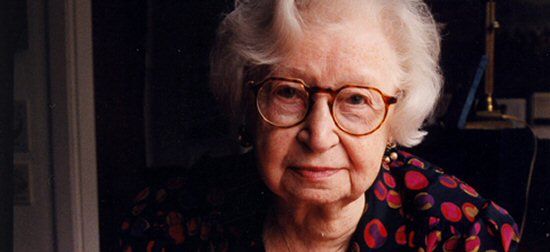
Miep Gies hid the family of Anne Frank for more than two years in an Amsterdam attic after the Nazi invasion of the Netherlands.
Gies never accepted the label of hero she was given, stating "I don't want to be considered a hero. Imagine young people would grow up with the feeling that you have to be a hero to do your human duty. I am afraid nobody would ever help other people, because who is a hero? I was not. I was just an ordinary housewife and secretary."
She died yesterday at age 100.
For two years Miep Gies and her husband Jan, a municipal employee whom she had married in 1941, risked their lives to smuggle in food and provisions and news from outside, begging, buying and bartering what they needed from farmers and shopkeepers. They were helped throughout by her colleagues Victor Kugler, Johannes Kleiman and Bep Voskuijl.Rest in peace, Miep Gies. And yes, you were, in fact, a hero.
Miep acted as a confidante for the adolescent Anne, bringing her paper for her diary and, on one occasion, a pair of second-hand high-heeled shoes. The Gies's heroic feat of humanitarianism ended on August 4 1944, when the Frank family were betrayed (by a person whose identity remains unknown), arrested and sent to concentration camps.
When the Gestapo arrived, Miep Gies was at her desk in the office below. She recognised from the voice of one of the arresting officers that he was Viennese, and she managed to charm him, perhaps saving her own life.
She never saw her Jewish friends again but "could tell from the sound of their feet on the wooden steps that they were coming down like beaten dogs".
Later, at considerable personal risk, she went to Gestapo headquarters to try to bargain for their release – but to no avail. Eventually she returned to their hiding place and found Anne's diary, its pages scattered over the floor.
She intended to return it to its author, knowing how important the diary had been to her, and locked it away without reading a word. Nearly a year later, Anne's father Otto returned from Auschwitz. He knew his wife and friends had not survived, but still hoped that his two daughters, Margot, 18, and Anne, 15, had been spared.
Two months later he received a letter that confirmed that both girls had died in Bergen-Belsen in March 1945, less than a month before the camp was liberated by British soldiers.
Miep Gies was with him when he received the news and could not find the words to comfort him. Then she remembered Anne's diary. She took it out of the desk and gave it to him, saying: "Here is your daughter Anne's legacy to you."




Shakesville is run as a safe space. First-time commenters: Please read Shakesville's Commenting Policy and Feminism 101 Section before commenting. We also do lots of in-thread moderation, so we ask that everyone read the entirety of any thread before commenting, to ensure compliance with any in-thread moderation. Thank you.
blog comments powered by Disqus